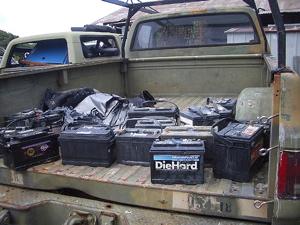Lead poisoning in developing countries
(Image: mk.carroll/Flickr)
Eighty percent of the lead produced in the United States goes into car batteries. Virtually all of the batteries here are recycled, but overseas, in developing countries, they’re a deadly problem.
Perry Gottesfeld, Executive Director of Occupational Knowledge International, is working to reduce the risks from exposure to lead batteries and other industrial pollutants. He spoke with “Living on Earth’s” Bruce Gellerman.
According to Gottesfeld, 120 million people around the world are overexposed to lead. “That’s three times the number infected by HIV AIDS. And this problem is going largely unnoticed under the radar screen.”
Gottesfeld says the problem is global. Batteries are being melted down on the side of the road and sold as scrap metal. But melting lead releases it into the environment where it settles in soil and dust and people are exposed.
In 2008, 18 children died from lead poisoning in Dakar, Senegal. “Lead batteries were brought to this village that specializes in recycling and many women and children got involved in taking apart the batteries, taking out the lead and melting down this material for scrap,” says Gottesfeld. When the price for lead jumped to 4,000 dollars per ton, demand increased dramatically. Melting could still earn a profit despite the fact that 50 percent of the lead gets evaporated into the environment.
“In the case of Senegal, these children were reportedly strapped to their mother’s back while they were dismantling and then melting down these lead batteries. And, of course, they got exposed as their mothers did, but the same exposure has much more detrimental impacts on very small children than it does adults.”
Many developing countries have a growing battery industry but no internal sources of lead. They depend instead on imports. Reportedly in Senegal it was an Indian company offering a high price for lead and encouraging melting. China is another country with a widespread problem of lead poisoning.
Gottesfeld’s organization, OK International, proposes that battery companies obtain environmental certification and agree to take back batteries to be properly recycled. They are working with some of the largest battery companies in India. “And these companies have come forward voluntarily to meet the standards in our Better Environmental Sustainability Targets or BEST standard. And companies that meet this will be able to place an eco label on their product and demonstrate to consumers that they are meeting these environmental standards.”
Hosted by Steve Curwood, "Living on Earth" is an award-winning environmental news program that delves into the leading issues affecting the world we inhabit. More "Living on Earth."
